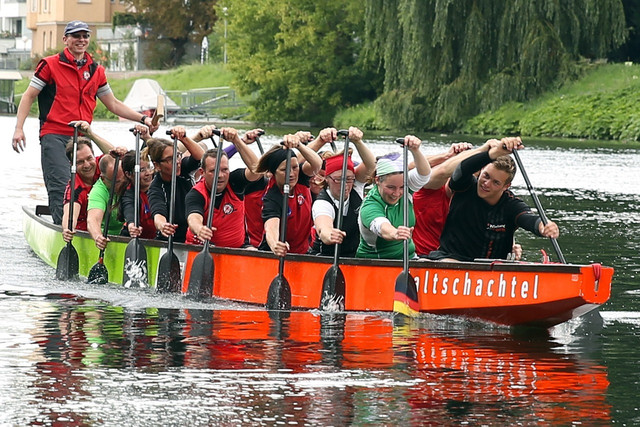Knowing how to build trust in a team is a critical skill in many areas of life. Whether you want to establish trust within your work team, friend group or project group at university –– we’ll show you how to go about it.
As a team leader, you should know how to build trust within a team. That is because you have the power to teach team members to rely on each other. If you’re not sure where to start, don’t worry! We’ll provide you with ten methods to build trust in a team. These methods can improve the overall group dynamic, productivity, create engagement and prevent a negative work environment.
While the methods we’ve looked into mainly apply to the work field, we’ve made sure to include a section about trust in friend groups, so make sure you’ll stay until the end!
1. Encourage Open Communication And Honesty
Not knowing how to build trust within a team could result in people talking badly behind the back of others or holding back ideas because of a lack of open dialogue. But with effective and healthy communication, this can be prevented. Check out these tips on effective communication in the workplace.
Set a good example for healthy communication: People respect their managers, boss or even co-workers as a role model. Thus, try setting the tone for what communication should be like. Some examples are making sure to interject when someone gets interrupted while speaking and addressing conflicts directly.
2. Get To Know Your Team Personally



Getting to know your team members on a personal level can be an easy and fun way of building trust. Of course, it depends on the overall hierarchy in your company, and your personal preference. But especially if you are part of a younger business or a startup with low hierarchies, it’s a good opportunity. How about organizing team lunches, regular team events or making new weekly traditions such as after work drinks on Fridays where you discuss topics outside the workplace?
You could also try other team-building activities like renting a boat, trying out an escape room, cooking class, comedy show or organizing a scavenger hunt. Ask your teammates about their ideas too. Is there something they always wanted to do as a group? Conquering obstacles as a group and meeting outside the office can create meaningful memories, which in turn can build trust within a team.
3. Display Positive Body Language



Body language is a huge part of communication. Be aware of the overall group energy and encourage eye contact. There are different listening types, but you should aim for active listening, where body language is an ideal tool to match the tone of conversation.
4. Encourage Questions And Regular Feedback Meetings
Especially when new employees or young graduates join the team, it is important for them to get to know the company culture and rules. Make sure they feel encouraged to voice their opinions and raise questions, so they feel included from the start. Having regular feedback sessions can also build trust, because it strengthens the connection between employee and supervisor — the more positive connections, the more trust will grow.
5. Empower Your Team To Be Self-Organized And Take Initiative
Encouraging Self-Organization and Initiative, is one way of building trust in a team. It gives team members freedom and makes individual employees realize their responsibility and impact. One part of Self-Organization includes dividing tasks efficiently within a team, which has members learn how to trust each other. It is also important that smaller teams meet up regularly to update each other. This way, they can find out how they complement each other, which in turn increases trust.
6. Encourage Emotional Trust And Empathy
According to the International Journal of Organizational Analysis, emotional intelligence (defined as the ability to perceive one’s own and others’ emotions) predicts an increase in trust. More precisely, researchers argue that emotional intelligence influences the final decision to trust someone. Likewise, showing empathy increases trust because it results in team members feeling understood, respected and taken care of. Try putting yourself in the shoes of your teammates.
7. Celebrate Successes And Failures
Celebrating successes and failures enables the team to learn more about each other’s qualities and skills, but also shows them that failure and hardships are inevitable and that the team will stick together nevertheless. Over time, this will also show the team how their relationships build up throughout these highs and lows, making them aware of the importance of building trust in a team.
8. Be Transparent And Consistent With Agreements



One important factor in learning how to build trust in a team is ensuring that every team member is on the same page. This concerns working hours, regulations on where to meet up, and additional etiquette to follow during team meetings and collaborations. If you are in a leading position, make sure to provide clear guidelines and be consequent in implementing those.
9. Solve Conflicts Effectively
Another important part of knowing how to build trust in a team is learning about conflict-solving. If there is a conflict between two or more members of a group, trust is most likely violated and needs to be rebuilt. To do so, it is important to acknowledge the conflict instead of pushing it under the table. Provide room for team member to discuss it and give support where possible.
Put the conflict in a bigger context. What are the consequences, and what can you take away from this for the future? Lastly, encourage the involved parties to forgive each other, in order to move on from the situation.
10. How To Build Trust Within Your Friend Group



Knowing how to build trust in a work team is great, so use this knowledge to build trust in your other relationships too! Here are some things to consider:
- Treat your friends with respect: Respecting boundaries in relationships and embracing differences are essentials to a healthy friendship.
- Avoid rumors or gossip: Talking behind each other’s backs or making false assumptions are often the cause for broken trust. Try to be as honest and communicative as possible with each other.
- Be kind and compliment each other: Kindness helps strengthen relationships within your friend group.
- Plan regular hangouts: Trust doesn’t happen instantly, it needs time to be built. Make sure to check on your friends on a regular basis and actively schedule time to see them, even if it is just going for a short walk together.
- Open up to each other: Sharing your feelings and experiences with friends can make you bond and understand the other ones better.
- Apologize when necessary: When trust is broken, it is important to rebuild it by apologizing. Check out our article on how to apologize.
- Be consistent: Stick to promises and agreements made within the friend group. This consistency will help in building long-term trust.
Read More:
- 11 Signs of a Toxic Workplace & Actions to Take
- This is How You Start a Union in 8 Steps
- Voluntourism: An Industry That Does More Harm Than Good?
- Seasonal Affective Disorder: How to Conquer Seasonal Depression
Do you like this post?









